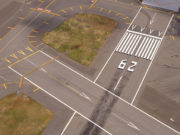Canada’s major airlines have two years to implement new flight and duty time limits that reduce both the number of hours that pilots may fly each year and the length of flight duty periods, Transport Minister Marc Garneau said today in announcing an overhaul of Canadian Aviation Regulations dealing with pilot fatigue.
“Transport Canada’s new regulations align with today’s scientific data, international standards and best practices, and respond to concerns raised by communities, pilots and airlines,” Garneau said. “By providing air operators the option to implement fatigue risk management systems, these new regulations also recognize the unique operations and realities of Canadian air operators.”
The new fatigue rules will limit pilots to 1,000 flight hours in any 365 consecutive days, compared with the 1,200-hour limit in current regulations. The new regulations will retain the existing 300-hour limit for 90 days and add a new requirement of no more than 112 flight hours in any 28 consecutive days. Currently, pilots may fly no more than 120 hours in any 30 consecutive days. The new regulations will eliminate the existing requirement of no more than 40 to 60 hours in any seven consecutive days.
The new regulations will set a maximum flight duty period of between nine and 13 hours, depending on starting time and sectors flown. The previous limit was about 14 hours.
The fatigue rules also will extend required rest periods from approximately eight hours under current rules to between 10 and 12 hours under the new rules.
Operators also will have the option of using fatigue risk management systems to enable them to identify sources of fatigue and manage related risks.
The regulations will apply to Canadian commercial transport services, including major Canadian airline operators and smaller and regional operators. Major operators have two years to implement the new requirements; smaller and regional operators have four years.
The Air Line Pilots Association, International (ALPA) said that it commends TC for the new flight and duty time regulations, which it characterized as “long overdue.”
ALPA added that for years, the regulations “have been acknowledged by aviation industry experts as inadequate for ensuring that pilots are well-rested when they fly.”
ALPA President Capt. Tim Cannoll said that the regulations “bring Canada in line with the rest of the world and, above all, improve safety for passengers and flight crews alike. Flying while fatigued is simply unsafe. These new rules will give pilots and operators the guidance they need to ensure the crew are fully rested before reporting for duty.”
TC said it also is introducing amendments to regulations to prohibit any flight crewmember from working when they are not fit for duty.
“This includes consumption of alcohol or drugs, mental and physical conditions, and fatigue,” TC said, adding that the amendments will prohibit flight crewmembers from working within 12 hours of consuming alcohol, up from the previous eight-hour limit.
Fatigue management in rail, marine and air transportation is one of three multi-modal issues on the Transportation Safety Board of Canada’s Watchlist 2018, which identifies key safety issues in the country’s transportation system.

